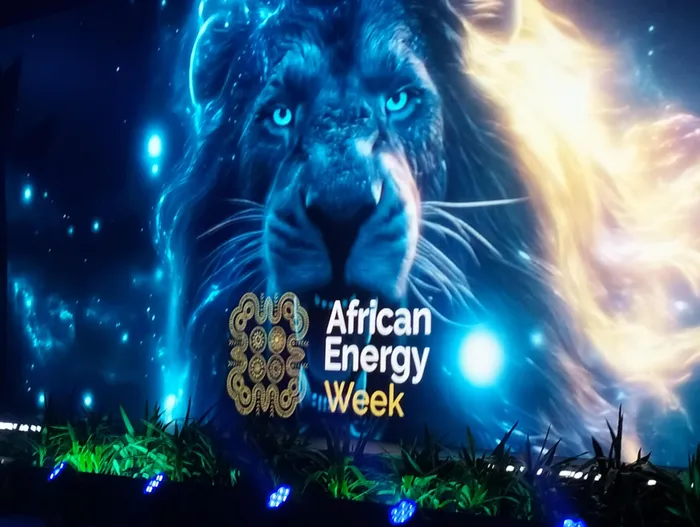SA facing oil and gas investment challenges amid a surge in global Africa investment
Oil and gas

The stage af the opening of the African Energy Week for 2025 that was held in Cape Town. Many African countries have reported an increase in investment and a surge in development of their oil and gas sectors.
Image: Edward West
Many African countries have overhauled their oil and gas regulatory and poplicy frameworks to make it easier for international companies to operate, explore and obtain production licenses, but South Africa remains a laggard.
This emerged on Monday, during the first day of the African Energy Week conference that was being held in Cape Town, where even the opening dancers were singing "drill, baby, drill", words that only two years ago might have seemed an anathema to energy conferences, because the focus then was on decarbonisation and the renewable energy transition.
With renewable energy now seemingly at the tail-end of delegate discussions, Kosmos chief executive Andrew Inglis pointed out that oil and gas resources are key to energy security for countries, and the International Energy Agency had recently stated that global oil and gas investment is projected to reach $570 billion in 2025 to meet growing demand, and that fully 90% of that amount would be needed just to make up for the natural decline of existing oil reserves.
With oil and gas projects generally requiring very long lead development times of many years, and substantial capital investment, Inglis said it is not just regulatory certainty, and speed and the complexity of getting project approvals that makes the projects succeed, but the international oil operator also needs to be able to have a good partnership with the host government, one that is resilient enough to last decades, and also overcome the many challenges that arise along the way.
NJ Ayuk, executive chairman of the African Energy Chamber, said in his address that South Africa's oil and gas development was "a mess," as projects could not get off the ground due to persistent legal challenges, and there was a lack of a suitable regulatory environment. "It is time to pass legislation," he said.
Gil Holzman, President and CEO of Eco Atlantic Oil & Gas, said that the South African government needed to be "much more involved" in the expansion efforts of its oil and gas sector, because in the year since his last presentation at the same conference, where he had said the same thing, Namibia had drilled 6-7 exploration wells in the Orange Basin and had made two discoveries.
But Namibia only held about 25% of the Orange Basin offshore acreage; the rest was in South Africa, and not a single well had been drilled in the South African acreage over the past year, this while his company knew from seismographic data that there was possibly as much as 30 billion barrels of oil waiting to be exploited.
Referring to South Africa's wish to also develop new oil refining capacity, he said the oil resources need to be explored before they could be exploited and the South African government needed to protect its international investments. "This cannot continue in South Africa," he said.
Tseliso Macubela, deputy director-general of Mineral and Petroleum Regulation at South Africa’s Department of Mineral and Petroleum Resources, said that the country had in the Petroleum Agency of South Africa one of the best upstream regulatory bodies in the world; however, one area the government "has not yet cracked properly" was in the area of consultation, particularly with the public, and "we have been found wanting on the technical ground." South Africa's regulatory bodies needed to work with international investors to "see how we should approach this," he said.
He said the oil and gas deposits were an opportunity to grow South Africa's oil refining capacity, and the department would make sure that new regulations were formulated that would support the establishment of new refining capacity in the country.
Godfrey Moagi, CEO of the recently established government-owned South African National Petroleum Company, said they were aware of the expense and great amount of time required to start an oil and gas sector development, and the only way forward was through partnerships between investors and the government stakeholders. He said South Africa could not afford to lose the opportunity in the sector held by its unexploited resources, and "the road ahead may be a bit bumpy, but we need to get excited."
Other countries that reported a big surge in investment and development of their oil and gas sectors at the conference were Ghana, Senegal and Nigeria.
Senator Heineken Lokpobiri, who for the Nigerian government oversees upstream and downstream oil operations and investment strategy, told delegates that Nigeria’s oil and gas production sector had been “stagnant” for a decade, but the new government that came to power in 2023 brought in new regulations, legal and financial frameworks, and incentives to make it easier for international companies to operate in the country’s deep water, shallow water and onshore sites.
He said the country was once again experiencing strong investment demand for its oil and gas resources.
Visit:www.businessreport.co.za